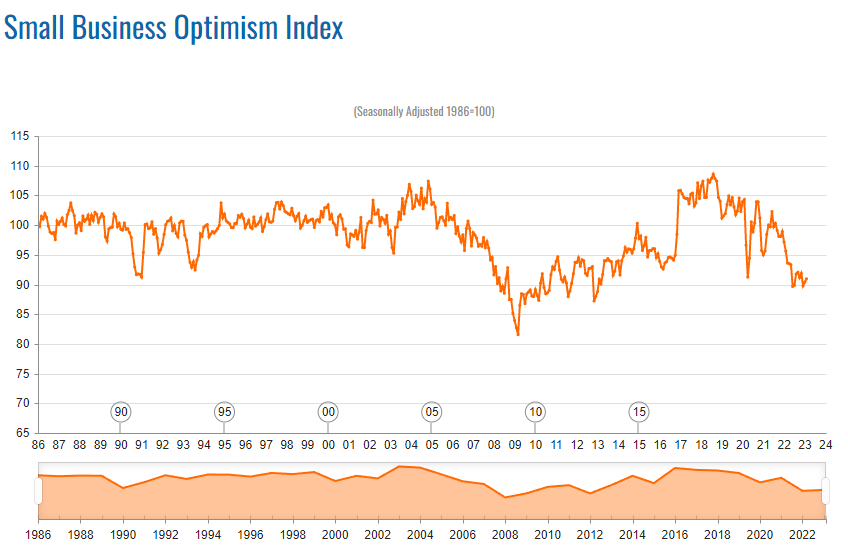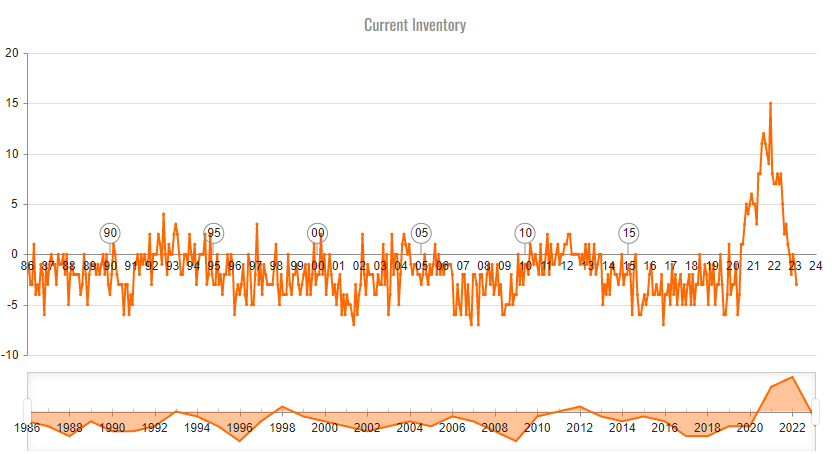Some interesting NFIB Charts
“The only thing that really matters in asset allocation is sidestepping some of the pain when the rare, great bubbles break.” - Jeremy Grantham
Good times.
“In short, the Fed since Volcker has been pretty clueless and remains so. What has been more remarkable, though, is the persistent confidence shown toward all of these four Fed bosses despite the demonstrable ineptness in dealing with asset bubbles.”
[Taylor] Swift was almost one of those celebrity [FTX] spokespeople, with FTX offering her $100 million over three years to sponsor the exchange in talks throughout 2021 and 2022…
The one person I found that [talked to their lawyers] was Taylor Swift,” Moskowitz said. “In our discovery, Taylor Swift actually asked them: ‘Can you tell me that these are not unregistered securities?’”
Friends of the show Steph Pomboy & Keith McCullough. This discussion is like the anti-CNBC, which is a good thing.
Along the same lines, here’s Adam Taggart with Michael Kantrowitz discussing some useful economic indicators
Speaking of CNBS, they always call Jeremy Siegel “the professor,” but strangely never tell viewers that he is a Senior Investment Strategy Advisor at WisdomTree.
Inflation is basically down to the Fed's target of 2%: Wharton's Jeremy Siegel
Seems like a lot of writers’ Substack Notes are navel-gazing stuff. You can see mine here - just click on “Notes” vs “Posts.” My notes will generally be more fun stuff.
In the podcast above, Michael Kantrowitz talks about how useful he finds NFIB (National Federation of Independent Business) data to be, so I thought I’d revisit it.
Here’s their Small Business Optimism Index (I always prefer multi-decade charts, so this is nice.)

“Plans to increase inventories (The percent of respondents who plan to "increase" inventories minus those who plan to "decrease" inventories in the next three to six months.)”
Wow.
“The percent of respondents who report that their inventories are currently "too low" minus those who report their inventories are currently "too large".”
Looks like that supply-chain shock is over.
Good grief:
“The percent of respondents who think general business condition will be "better" minus those who think it will be "worse" six months from now. Example: A net, negative 28 percent means 28 percent more small business owners think that general business conditions will be worse than those who think it will be better six months from now.”
“The percent of respondents with a position they are currently not able to fill.”
Again, wow.
“The percent of respondents who think that credit conditions will be "easier" minus those who think credit conditions will be "harder" during the next three months.”
OK, this looks fairly normal.
“Percent of respondents who think the next three months will be a good time for small businesses to expand.”
“What is the single most important problem facing your business today?”
Inflation, and quality of labor.
NAHB/Wells Fargo Housing Market Index
If you live in California this is a very strange graphic: Existing Home Sales by Price Range
The ISM Manufacturing New Orders subindex
The Initial Jobless Claims chart - which goes back to the 1960’s(!) - is very much skewed by the 2020 spike when the government shut down the economy, so I made it a semi-log chart. You can see that initial claims start to rise just before or at the beginning of recessions (which makes sense).
Again, credit spreads still seem fairly complacent. Here is the CCC and lower yield minus the 10 year Treasury yield (I don’t know if this combo is something people look at in real life, but it’s what I thought to check out.) Seems sort of at middle of the road levels:
Also the VIX is very low, and like the St. Louis Fed financial conditions index, it has a knack for getting very low right before going very high.
Online US real estate firm Opendoor cuts 22% of workforce “roughly 560 jobs…The announcement followed a previous round of layoffs in November when the San Francisco company cut 550 jobs, or about 18% of its workforce at the time.”
Redfin: Home Prices Fell 3% in March—Biggest Annual [Percentage] Drop in Over a Decade “The median U.S. home sale price fell 3.3% in March to $400,528, the largest year-over-year drop since 2012. That follows February’s 1.2% dip, which was the first annual decrease since 2012.”
Again, rate of change concerns me less than absolute levels. Some interesting data though.
You may have heard that Blackstone - which has gated its huge BREIT product - has raised $30 billion for further real estate investing, this time distressed, not paying top dollar like they did with BREIT. This time is different. (Keep in mind that $30 billion is about 7.5 days of Fed QE. An unimaginable number.)
So Blackstone recently bought six industrial properties in the Toronto area for $400 million Canadian, which is like $200 or something.
“Global logistics is one of our highest-conviction investment themes, and high-quality, last-mile industrial properties like these continue to benefit from some of the strongest real estate fundamentals in Canada,” said Janice Lin, Blackstone’s head of Canada real estate.
We’ll see.
They also bought a Swedish Portfolio of 47 properties from Corem for SEK 5.35 Billion. I know what you’re thinking - how much is that in Canadian Dollars, right? 696 million.
According to Blackstone’s Kathleen McCarthy, both assets were purchased at a 30% discount to replacement costs.
I know we tend to have sympathy with the tenant vs. the evil landlord, but this is ridiculous:
Oakland landlord stands to lose everything after tenant fails to pay rent for 3 years
"I'm back due some rent...$56,000 over the last three years from my tenant," said John Williams, as he read a sign he plans to bring to Oakland City Hall Tuesday.
Williams currently lives in the top unit of the duplex he's owned for nearly 20 years. It is his only home. Renting it out was supposed to secure his retirement. But at the end of this month, he's facing foreclosure.
He said for 10 years, Martina Matin, his tenant in the bottom unit, had paid $1,500 for the 3-bedroom, 1-bath, though the checks always came late or bounced.
But in March 2020, she stopped paying altogether.
"It's a nightmare," Williams told KPIX. "It's an absolute endless nightmare where it's ridiculous that we're put in this situation for three years, with no conversation, or any kind of dialogue on how do we recapture our funds, other than we have to go to court to do that, or chase them or lose the money."
In the last three years, Williams has amassed a stack of documents chronicling the problematic tenant. He said she never provided any proof of a COVID-related hardship. Martin has been living rent-free with two children at the property for three years.
In fact, Williams provided documentation of Martin's storage and transportation business registered to her address. He often spotted movers and moving trucks outside of his home. Martin also runs a local massage business, Indulge-N-You, according to phone records.
KPIX got in touch with Martin over the phone. She confirmed her identity but declined to say anything further after she was asked why she hasn't paid rent in three years. She hung up the phone.
Currently, Oakland landlords cannot evict tenants over COVID-related rent debt.
During the pandemic, Williams tried to sell his property but said he was ultimately unsuccessful due to Martin's occupancy. Williams also said he had offered to forgive all of Martin's back rent, if she would just move out. He said she declined that offer.
"Those kind of folks who are abusing and the fraud in the system. Those kind of tenants should not be covered by the tenant protections," said Williams. "I'm totally here for the tenant protections, but when it's unlawful such as this case is, I think that should be a reasoning to remove any protections for anyone."
Be careful what you wish for. Blackstone end up buying this property and jacking up the rents. And they have better lawyers than Mr. Williams.
Norges Bank Investment Management, which held some SEK 1.7 billion ($160 million) of SVB shares and SEK 1.1 billion in bonds prior to the March collapse, absorbed an SEK 1.64 trillion loss last year, dwarfing the SEK 633 billion of red ink in 2008 for its worst annual shortfall on record...
Gosh, I sure hope Mark Carney, Chair of Brookfield Asset Management and Head of Transition Investing (and also the former head of the Bank of Canada and the Bank of England) is going to be OK.
The Bitcorn Ratio
Been doing this since 2017. Don’t know why.
Sweatshirt o’ the Day

"I think that most members of the Federal Reserve Board ought to resign, based on their performance on inflation. We have to have accountability again..."
Chris Whalen, April 2022




























I did pretty well in $BAM for a few years but sold soon after the start of the pandemic. Brookfield’s mortgage debt on properties are non-recourse, but I used to worry whether the parent company would backstop the debt for reputational reasons (I guess I have a Berkshire mindset). I suppose we know the answer now - non recourse is non recourse. I put the proceeds from BAM into Berkshire so I’ve done ok.
Great post. I have a client who is also a rental property owner with properties in Oakland. The stories are absolutely insane (felony-worthy threats from tenants, the various hoops, etc.). Also had a long-time tenant live rent-free for 2 years. This owner tries to do everything by the book, but the amount of trouble is just nuts.